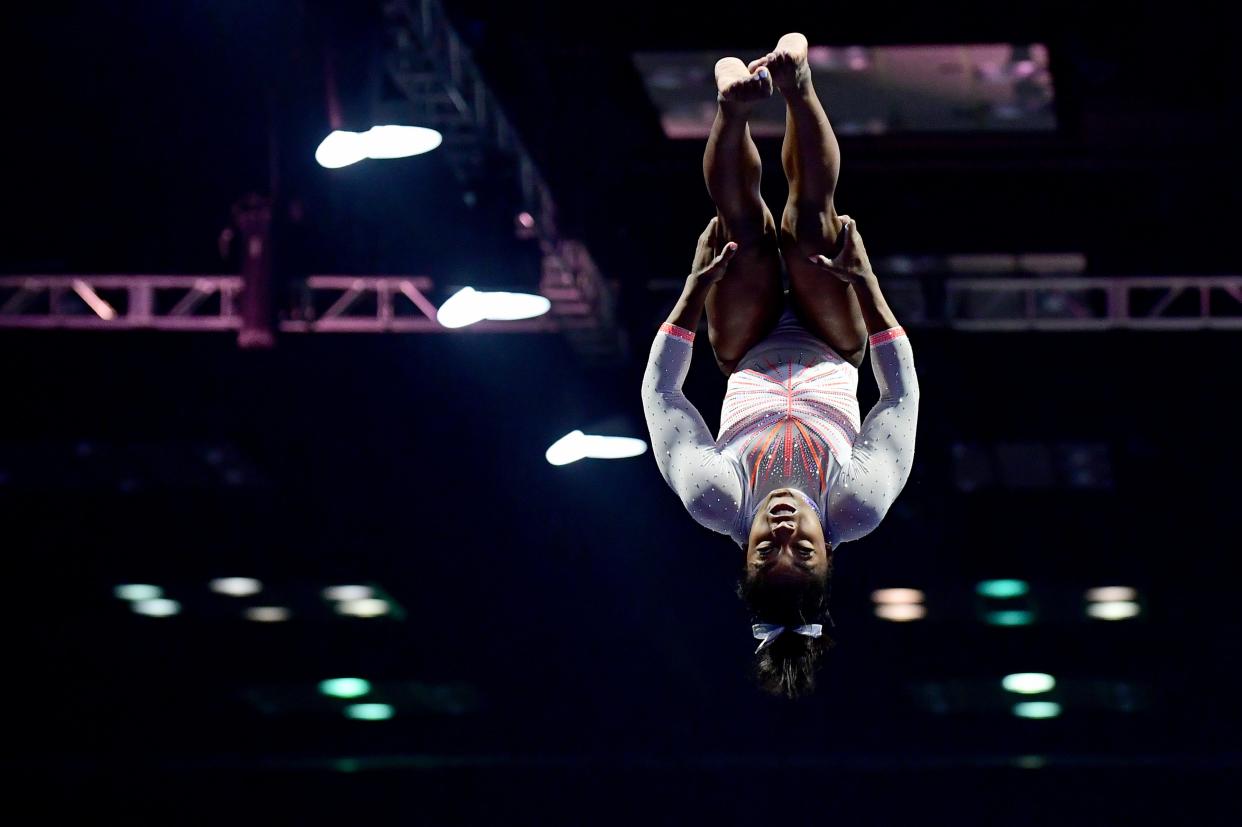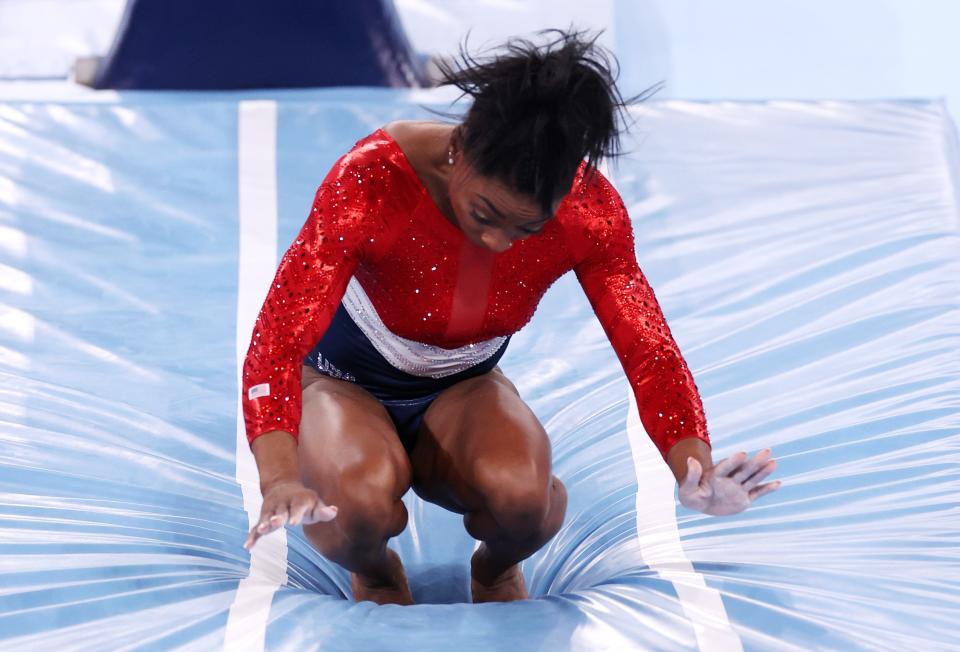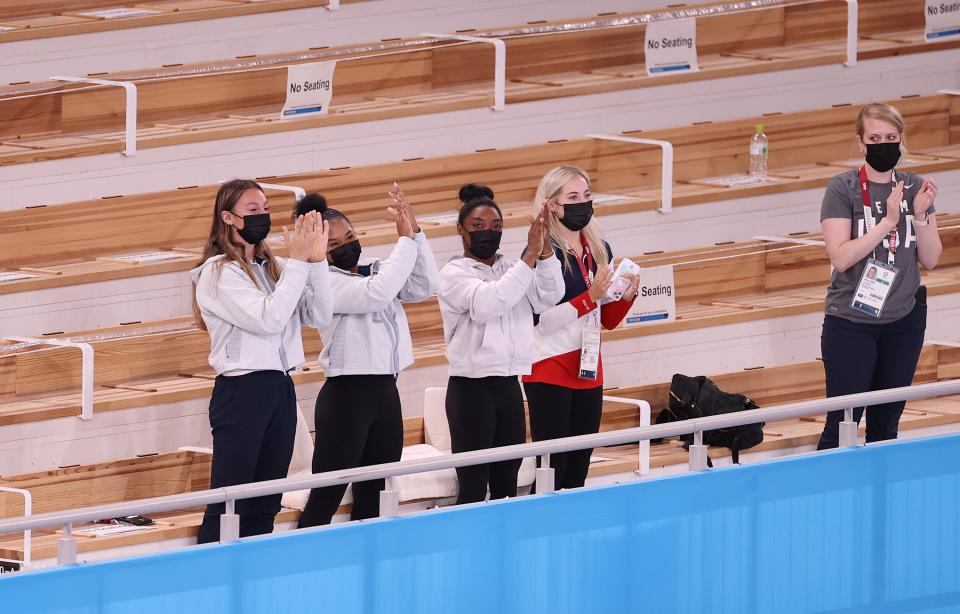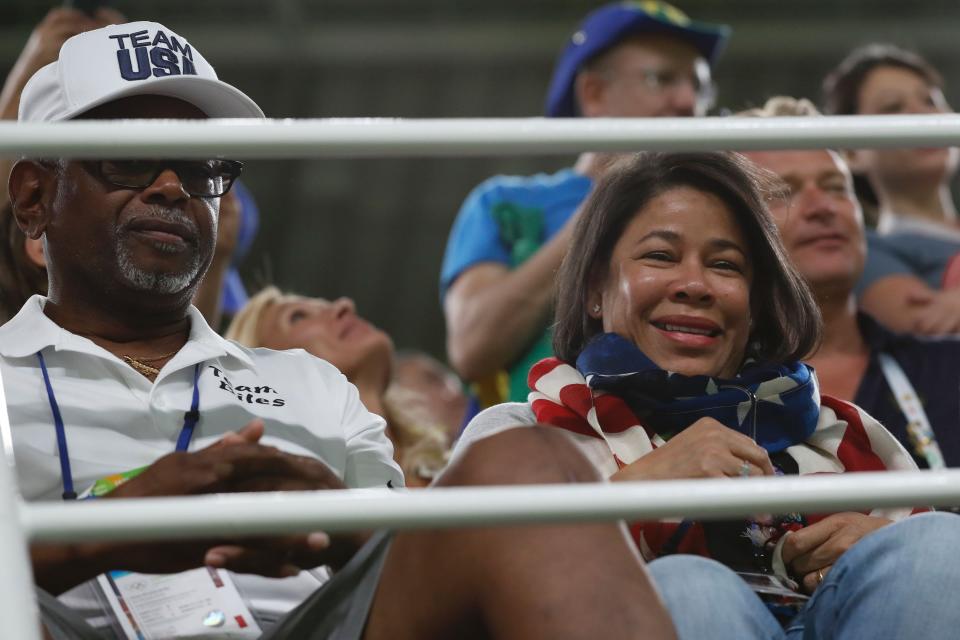Simone Biles: Soaring and stumbling in search of a safe landing

There are two video clips of Simone Biles that tell part of an astonishing story.
One is from 22 May 2021, at the Indiana Convention Centre in Indianapolis, in which Biles performs the Yurchenko double pike vault – the first female gymnast to do so in a competition.
During the move itself – and then as she jogs away from the landing mat, unable to suppress a brief smile – she appears buoyant, focused and aware. Confidence oozes from her.
The next is from just two months later, when the athlete tries to perform a similarly difficult move – an Amanar – at the Tokyo Olympics, but fails to do so, managing only one-and-a-half turns rather than the two-and-a-half she had intended.
Not just in the way she stumbles forward upon landing, her body language reveals that something is wrong.
“She looked lost in the air,” said an NBC Sports commentator, unable to hide her astonishment. Shortly afterwards it was announced that Biles was withdrawing from the finals amid concerns about her mental health.
“Whenever you get in a high-stress situation, you kind of freak out,” she later told reporters. Asked what was her priority now, she responded: “To focus on my wellbeing. There is more to life than just gymnastics.”
She would explain, over the coming hours and days, what experts watching her had suspected – that she had lost the sense of where she was in the air: her spatial awareness. Biles, 24, would later describe it as a mental block; as her body not being in sync with her mind. At one point she described the sensation as “the twisties”.
The two videos – one showing a brilliant, record-setting athlete at the top of her game and seemingly poised for another medal haul; the other a young woman buckling in the spotlight – help explain something of the pressures that have weighed on Biles’s shoulders as she and the world got ready for Tokyo – an Olympic competition postponed by 12 months by the Covid pandemic.
But they only tell part of the story of Simone Biles: a young woman who had won against the odds several times over, long before she arrived in Japan, and whose presence there in a USA Gymnastics outfit was a reminder of a sexual assault scandal that rocked the sport, in which dozens of young women dispatched to represent their country were betrayed.
“I don’t think you realise how dangerous this is on hard/competition surface,” she wrote on Twitter. “Nor do I have to explain why I put my health first. Physical health is mental health.”
The reaction to Biles’s decision to withdraw from a series of team and individual events was varied.
There were some – invariably those who appeared to have little or no sporting knowledge, and even less experience of performing at the highest levels of the discipline – who found in her behaviour a weakness and cowardice they felt was all too common in today’s world.
Probably to deliberately spark controversy, they alleged her decision to withdraw was nothing more than another case of someone “bottling it”.
Yet the overwhelming reaction from fellow athletes, and mental health professionals, was hugely supportive. She had done precisely the correct thing, they said, by putting her own wellbeing first, and they praised her courage for speaking out about mental health and the pressures that come with not only performing at such a high-octane event as the Olympics, but carrying such expectations of success.
In the United States, there was also praise from leading figures from political both parties.
“We are proud of you and we are rooting for you,” tweeted Michelle Obama.
Republican senator Mitt Romney, who in 2002 served as chief executive of the 2002 Winter Games in Salt Lake City, was similarly supportive.
“I love and admire Simone Biles and our Olympians,” he wrote on Twitter. “I take pride in them, not so much for the medals they win as for the grace, humanity & character of their hearts,” he added.
Those arguing as to the perils of young gymnasts being forced or pressured to perform when they had lost their confidence did not have to search far to find supporting evidence.
They pointed to the experience of Soviet gymnast Elena Mukhina, who broke her neck in two places and lost the use of all her limbs after suffering an accident while attempting to perform the Thomas Salto, a floor move so dangerous it is now banned from competitions.
She was attempting to do the move having rushed her recovery from a leg injury, in order to perform it at the 1980 Olympic Games in Moscow, which was just two weeks away. Mukhina had apparently told her coach that she feared she would break her neck doing the move. He dismissed her concerns.
She later told the Russian magazine Ogoniok, “I really wanted to justify the trust put in me and be a heroine.”
She died in 2006, at the age of 46, from complications of quadriplegia.
Closer to home, there was the case of Kerri Strug, a member of the so-called “magnificent seven” who took part in the 1996 Olympic Games in Atlanta. She was pushed out to perform a vault by her coaches despite having an injured ankle, in order to secure the gold medal for her team.
Photographs showed her being helped off the mat by team doctor Larry Nassar, who would later be exposed as a serial sexual abuser, and other members of the coaching staff.
“This is the Olympics,” she later said at a press conference. “This is what you dream about from when you’re 5 years old.”
Strug, now 43, had to be carried to the victory podium by coach Bela Karolyi, and then taken to hospital. It would emerge that night that the US team would have still won gold without Shrug’s career-ending vault.
While she was considered a national hero and met president Bill Clinton, she was unable to perform in the subsequent events in the 1996 games, and never appeared at the Olympics again.
Dr Kenneth Yeager is a professor of sports psychiatry at Ohio State Harding Hospital, located in Biles’s hometown, Columbus. He tells The Independent he has worked with elite athletes for 30 years, and yet has rarely witnessed anyone display the “incredible courage” shown by Biles.
“And it’s a wonderful thing for young athletes to hear, that you really don’t have to just suck it up and pull yourself up by your bootstraps,” he says.
“The Olympics will come and go. But her mental wellness will be with her the rest of her life.”
He says he hopes Biles’s decision marks an inflection in the way mental health is viewed within the world of sports and beyond. He adds: “I think it is time for a national conversation.”

Simone Biles was born in Columbus, the state capital of Ohio, on 14 March 1997. She was the third of four siblings, and her mother, Shanon Biles, at the time struggled with drug addiction. Biles and the other children, Ashley, Tevin and Adria, spent much of their time in and out of foster care.
A foundational change in her life came when her maternal grandfather, Ron Biles, who had served in the US air force, came to Columbus to take Biles and her siblings to his home in Houston, Texas, in order to look after them.
Eventually two of the youngsters would go back to live with their mother’s sister, but in 2000, Ron Biles and his second wife, Nellie Cayetano Biles, officially adopted Biles and her younger sister, Adria. She has referred to them ever since as “mum and dad”.
David Bannon, a long-time sports reporter for the Houston Chronicle, has interviewed Biles and her family and knows her story well. Though officially retired from the paper, he is in Tokyo to cover the games and the drama of Biles’s plight.
He says Biles’s grandfather was financially comfortable, and was able to provide her and her sister with economic as well as emotional stability when they were at a crucial stage in their lives.
On a visit to a gym in Houston during a field trip organised by a daycare centre, Biles displayed a curiosity for the sort of skills she would later use with such devastating effect.
“Family has always been very important to her,” Bannon says from Japan. “I think that they have the tradition of Sunday dinners together.”
He says that during the pandemic, that tradition was interrupted, but Nellie Biles still prepared food for all the family, and they would come and collect it from the end of the driveway.
“Nellie would meet each of the children each week – Ron’s two children by a previous marriage, as well as Adria and Simone – in the driveway and give them their Sunday dinner,” he adds.
Feelings... 💭 #MeToo pic.twitter.com/ICiu0FCa0n
— Simone Biles (@Simone_Biles) January 15, 2018
And the couple have been hugely supportive of her professional career, travelling to all of the major events, including the 2016 Olympic Games in Rio, and cheering her on. Indeed, the games in Tokyo were the first time the couple had not been present in person.
Bannon says he believes Biles has both benefitted from and been harmed by her use of social media.
He says she has talked about several sensitive topics, including her relationship with her birth mother, a connection that still persists, in a seres of short documentaries called Simone vs Herself, on Facebook Watch.
At the same time it has opened her up to online abuse, something she sometimes does not let slide.
In 2016, for instance, a data hack of the World Anti-Doping Agency resulted in the release of her medical records, which showed she used methylphenidate, a stimulant that is usually banned.
The athlete, then aged 19, used Twitter to try and explain that she took the drug as a treatment for Attention Deficit Disorder (ADHD), and that she had been given permission to use it by the International Gymnastics Federation.
Bannon says: “And that just sort of indicated the nature to which information is being now being weaponised by some.”
Many commentators have suggested there is another layer associated with the abuse Biles receives online, because she is a Black woman.
Dr Brandale Mills is an expert on the way women of colour are perceived in the media, and the abuse and racism they face, particularly if they speak out to defend themselves.
“The flip side to the online abuse is that the internet provides a kind of safe haven, especially for communities of colour,” says Mills, a professor of mass communications at Norfolk State University in Virginia. “Because I’ve seen Black women, and Black people in general, rally behind Simone and this decision to protect herself and her mental health.”
She adds: “So on one side we have the haters, and on the other, this community that feels the need to keep her safe and keep her protected.”
Among the greatest challenges that Biles, along with many other US gymnasts, has had to confront was being sexually assaulted and abused by Larry Nassar. For decades, Nassar was the official team doctor for USA Gymnastics, and from the early 1990s he is believed to have assaulted at least 250 female athletes, among them stars such as Aly Raisman, the retired Olympian.

Critics say the organisation failed to investigate many allegations of abuse and was only forced to do so after an investigative report by The Indianapolis Star that provided detailed statements from named witnesses.
USA Gymnastics president and CEO Steve Penny resigned in 2017 amid widespread anger and outrage.
In early 2018, Nassar was sentenced to between 40 and 175 years in prison after pleading guilty to ten counts of sexual assault. Several of his victims appeared in court to deliver statements about the way their lives had been devastated by his actions.
Among them was Raisman, who was applauded by the court as she addressed Nassar.
“You have not taken gymnastics away from me,” she told him. “I love this sport, and that love is stronger than the evil that resides in you, in those who enabled you to hurt many people.”
She added: “The tables have turned, Larry. We are here, we have our voices, and we are not going anywhere. And now, Larry, it’s your turn to listen to me.”
There had been speculation that Biles too had been among his victims, something she confirmed herself on Twitter.
“Most of you know me as a happy, giggly, and energetic girl. But lately I’ve felt a bit broken and the more I try to shut off the voice in my head the louder it screams. I am not afraid to tell my story anymore,” she wrote as the court proceedings went ahead.
“I too am one of the many survivors that was sexually abused by Larry Nassar. Please believe me when I say it was a lot harder to first speak those words out loud than it is now to put them on paper.”
She added: “There are many reasons that I have been reluctant to share my story, but I know now it is not my fault.”
Biles did not compete in 2017, but in 2018 she took part in the World Championships, adding more gold medals to her haul despite performing while suffering with a kidney stone.

Last year, as she prepared for Tokyo, she and other athletes were forced to put their plans on hold as the pandemic forced the postponement of the games and left millions of people dead.
In an interview with CBS News, she revealed she had struggled to find the motivation to keep on training for another year.
“I just sat there and I was like, ‘I really don’t know how I’m gonna do this. Like, another year out? I don’t think it’s possible for me at this point mentally,” she said.
The interviewer asked her: “Not physically, but mentally?”
Biles replied: “Yes. Pushing through those trainings when I had in my mind, ‘In three months I’ll be done’, it’s like, how do you push back for another year?”
In the end, she took seven weeks off and then returned to her training schedule – up at 6am, and then six hours of training, six days a week.
Biles told NBC News that one of the reasons she wanted to participate in Tokyo – as the only member of the team to have been abused by Nassar – was to ensure some sort of accountability.
“If there weren’t a remaining survivor in the sport, they would’ve just brushed it to the side,” she said.
And in the aftermath of the decision to withdraw from a series of events and put her own wellbeing first, she acknowledged how badly she struggled to deal with having survived the abuse, and feeling let down by the organsation that was supposed to help her and her fellow female athletes.
(In 2019, she had voiced criticism of USA Gymnastics when she attended the National Championships, telling reporters: “I don’t mean to cry. But it’s hard coming here for an organisation having had them fail us so many times.”)
“Therapy has helped a lot as well as medicine and I feel like that’s all been going really well,” she told reporters in Tokyo, after she decided to pull out.
“But whenever you get in a high-stress situation you freak out and you don’t really know how to handle all of those emotions, especially being here at the Olympic Games.”
This time, it appears, Biles has the support of the coaches and teammates, her family and her many fans, as she starts to figure out what is next for her.
And among her many assets is a voice not afraid to speak out to ensure she puts herself first.
“We’re not just athletes. We are people at the end of the day, so we have to focus on that,” she said. “I think it shows the power of the athlete in protecting my mental wellbeing.”
She added: “I didn’t want to go out there and do something dumb and get hurt and be negligent. It’s not worth it, especially when you have three amazing athletes that can step up to the plate and do it.”
Read More
Ted Cruz defends Simone Biles amid criticism on the right: ‘She’s a tremendously talented athlete’
Tokyo 2020: Simone Biles pulls out of gymnastics finals of vault and the uneven bars
Suni Lee: Team USA’s new Olympic gold medallist couldn’t afford a beam so her father built her one

 Yahoo Movies
Yahoo Movies 
